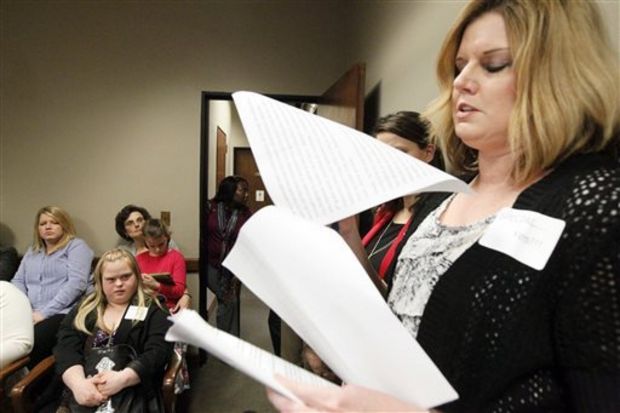

JACKSON, Mississippi (AP) — Parents who want Mississippi lawmakers to approve special education vouchers are adding their voices in support.
House and Senate lawmakers held a hearing Tuesday to showcase the proposals. Natalie Gunnels of Tupelo told lawmakers that public school administrators can’t or won’t take care of students like her son Patrick, who has trouble walking, is sensitive to noises, and has trouble reading and writing.
“It’s obvious to me and my husband that the public school system is not equipped to educate the Patricks of our state,” Gunnels said.
The plan would give debit cards with more than $6,000 on them to parents who withdraw their special education students from public schools. The money could be spent on private school tuition or private tutoring services.
Mandy Rogers, a disability advocate, said that the state has been promising improvements but not delivering since the federal law was passed.
“Thirty-nine years later, we’re asking when is the change going to happen?” she said. “Our children need options.”
The hearing came even as proponents say they were willing to make concessions to get the bills passed. They said they’re willing to limit the program to 500 students, ban homeschoolers and allow only students who have individualized education plans provided for under the federal Individuals with Disabilities Education Act. Mississippi has 66,000 students with plans, with 56,000 of those in grades above kindergarten.
Senate Education Committee Chairman Gray Tollison, R-Oxford, said lawmakers were considering limiting the aid to use in state-accredited schools or with tutors who are state certified.
“If we can get it to conference, there’s going to be significant work to ensure accountability,” Tollison said.
The proposal has created a split among special education advocates with some saying Mississippi’s special education system is so broken that students need an escape hatch while others say leaving public schools will reduce pressure for improvements for those left behind.
“We think the real issue is the problem that needs to be addressed, and that’s that our state consistently does not comply with the Individuals with Disabilities Education Act,” Joy Hogge, executive director of Mississippi Families as Allies for Children’s Mental Health, said Thursday.
Tuesday, lawmakers also questioned where students would go for services, considering limited capacity among current private schools.
“Where are these children going to get the care they actually need?” asked Rep. Chuck Espy, D-Clarksdale.
Some parents said they’d figure that out later.
“I don’t have a plan. If and when the bill passes, that creates options for my child to get taken care of,” Katie McCustion of Tupelo responded.
Some groups outside the state that promote school choice, including Arizona’s Goldwater Institute and Florida’s Foundation for Excellence in Education, support the bill.
“This bill is being fundamentally driven by people who believe in vouchers,” said Sen. Hob Bryan, D-Amory. “They do not believe in the type of public school system we have.”
But one of the sponsors, Republican Sen. Nancy Collins of Tupelo, said she knew of no plans to broaden the language in the bill to non-disabled students in the future, as was done in other states.


